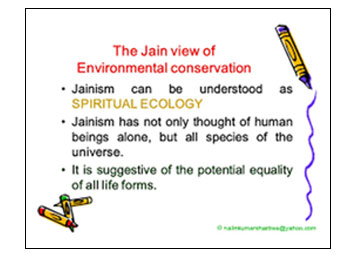Jainism asserts that there is a beginningless co-existence of soul and matter. Whatever soul possess, whether the capacity for speech, breath, or thought is the result of interaction with matter. This philosophy of Jainism makes people behave sensitively not only with living beings but with materialistic things also.
Jainism does not permit anyone to exploit even non-living beings. Apart from the philosophy of ‘Jeeva’ (animate) one of the most crucial components of Jainism is its theory of nonviolence that runs through the Jain tradition like a golden thread. It involves avoidance of violence in any form through words, deed, or thoughts not only to human beings but to the whole of the nature and requires reverence and compassion for all living being at every step of daily life.
Knowing (and renouncing) severally action against living beings. In the regions above, below, and on the surface everywhere and in all ways-the wise one neither gives pain to these bodies, nor orders others to do so, nor assents their doing so.
Through this unitized experience, the existence of souls is established. Mahavira goes on to say that one who is afflicted with lust is bereft of knowledge and perception. The truth will always baffle such a person. He indulges himself in action, causing violence to the beings of the earth body, water body, fire body, vegetable body, and others. These beings have consciousness (Santi pana pudho siya).
Non-violence doesn’t pertain in its physical aspect only but in mental aspect also, in fact and factually more so in its mental aspect. Jain believes that violence should not be even in the heart, mind and brain. Non-violence should not only be practised, it should be present in mind and thinking, by way of concern and compassion towards all life in nature.
In addition to Non-violence, the other tenets of Jainism, from which can be derived inspiration for preservation and conservation of environment include vegetarianism, a controlled way of life, and the concept of Aparigraha. These tenets form a basis for the conservation of nature.
The practice of these principles leads the practitioners to the conservation of mother earth. Jains are in forefront of bringing greater awareness everywhere and putting these principles into practice.
Nonviolence, the humanistic element, is based on the principles of equality and equanimity as applied in society. Nonviolence still may allow for the theory of caste, but the one based solely on one’s deeds and not on one’s birth.
Jainism tries to shape our attitude toward nature by prescribing humane and nonviolent approaches to everyday behavior. Jainism inspired its followers to safeguard what in contemporary discourse would be called the ecological perspective.
Jains, practice these principles and religious traditions prescribed for the protection of nature. Through its philosophy, its ascetic practices, and in its narrative arts and architecture, Jainism and its leaders have made efforts to create the society dedicated to love for all creatures.
The Jains are well-suited to reconsider their tradition in an ecological light, particularly because of their history of advocacy against meat eating and animal sacrifice, as well as their success at developing business areas that avoid overt violence.
However, some challenges remain. One expression of environmentalism involves tree planting projects. Though Jain lay people might participate in such activities, their nuns and monks most likely would not plant trees because of the harm caused to the earth in the digging process.
Another expression of environmentalism in India has been to establish forest preserves on property surrounding Jain temple sites. However, this generally requires blocking access to prevent collection of fodder, resulting in a further impoverishment of struggling peasants.






